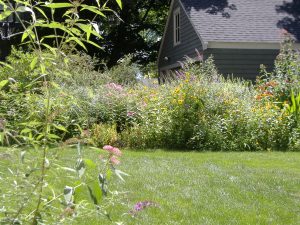LAWNS
The possibilities are endless once you stop thinking of lawns as a necessity. You can turn large areas of lawn that are unused for recreation into wonderful garden beds filled with trees, shrubs, etc. Wet areas can become rain gardens. Shady spots make wonderful woodland gardens.
GET RID OF YOUR LAWN (OR SOME OF IT)
copyright by Joanne Neale d/b/a Garden MentorSM

“Lawns are where our children and pets play. Do you want to expose them to harmful pesticides and herbicides? If you are paying a lawn company to treat your lawn, find out what it is being treated for and what exactly is being used. Ask your company to use an organic, slow acting fertilizer and gradually wean off the herbicides and pesticides. Don’t authorize preventive treatments that may not really be needed, as you can always treat a problem IF it arises (and is serious enough that you can’t ignore it). Remember, a perfect green lawn is not necessary unless you are running a golf course. Overseeding, judicious fertilizing with organic products (including topdressing with compost and leaving grass clippings on the lawn) will keep your lawn green and lush, even though you may end up with a few extra dandelions.”
More lawn tips: Allow several kinds of grasses to grow, including drought–tolerant fescues and clover, and mow high (at least 3 inches).
Resources:
- Organic Soil Solutions, based in Needham, has a helpful “Ten Tips for a Great Organic Lawn.”
- Green Newton has a listing of Recommended Lawn Care Providers who abide by Newton’s New Leaf Blower Ordinance and are “stewards of the Earth.” Or ask your lawn care provider if they offer an organic program.
- The town of Marblehead practices organic lawn care on all its parks, schools, and sports fields. Watch “One Town Just Says No to Pesticides”
- The Province of Ontario allows only certain, low-risk pesticides (such as soap, borax, and corn gluten) for controlling weeds and pests on lawns and gardens “to protect Ontarians from unnecessary risk.” Read more.
- Statement of the Canadian Cancer Society: “Pesticides are also used to make lawns, gardens and other green spaces look better. We call this use cosmetic because it’s not needed for health and safety. . . . The Canadian Cancer Society believes that pesticides should only be used when they are needed to protect our health, safety or food supply.” Read more.
- Tips for Healthy Lawns and Landscapes
PLANT GROUNDCOVERS, NOT BARK MULCH!
copyright by Joanne Neale d/b/a Garden MentorSM
“Perennial groundcovers can do the job of covering ground, preventing weeds and conserving moisture – just like bark mulch, only much, much prettier. Planting them may involve an initial investment of time and money, but it will save you both later on. Groundcovers are “living mulches” that give you a lot more for your dollar than a swath of wood chips. You may think that evergreen vinca, pachysandra and English ivy are the only groundcover plants available. Wrong! There are many, many perennials – both evergreen and non-evergreen – that will cover the ground while adding color, fragrance and pollinators to your garden with a minimum of care.”
Resources
Documents
Resources on the Web

